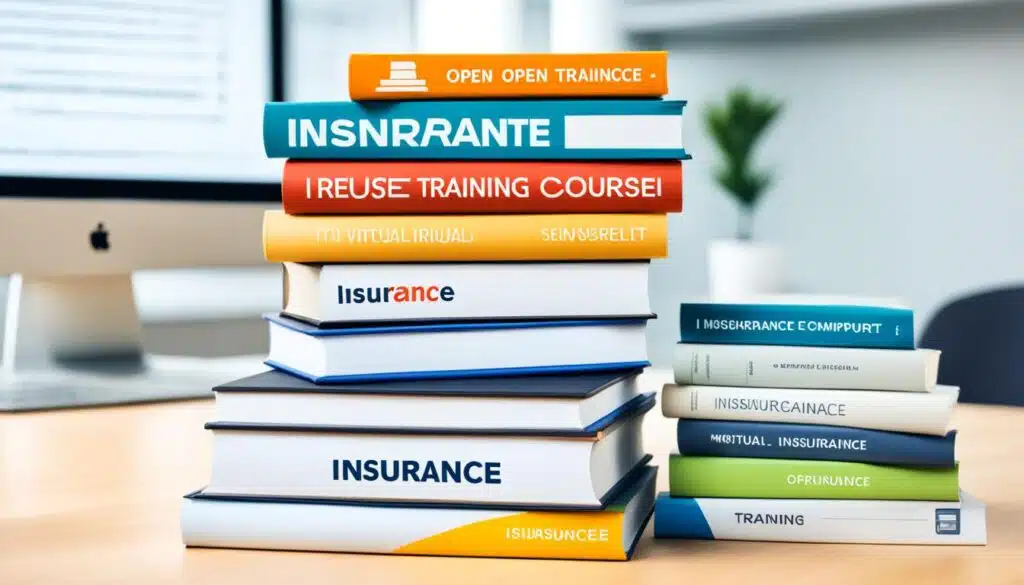Insurance adjuster training is essential for individuals looking to start a successful career in the claims industry. Whether you are aspiring to become an independent adjuster or work for an insurance company, obtaining the necessary training is crucial to excel in this field.
Insurance adjusters handle various types of claims, from property damage to auto accidents, and they play a vital role in helping individuals and businesses recover from loss and restore their lives. To be effective in their job, adjusters need to have a deep understanding of insurance policies, estimating damages accurately, and effectively communicating with all parties involved.
So, what types of training do insurance adjusters need? Let’s explore the essentials:
Types of Training for Insurance Adjusters
1. Pre-Licensing or Exam Prep Training: Before becoming a licensed adjuster, individuals need to pass a licensing exam. Pre-licensing or exam prep training provides the knowledge and tools necessary to succeed in the licensing process.
2. Job Training: Once licensed, adjusters need on-the-job training to learn the practical skills required for the position. This includes estimating damages, using software systems, conducting thorough investigations, and negotiating settlements.
Tips for Studying to Get Your Adjuster License
Studying for the adjuster license exam can be challenging, but with the right approach, you can increase your chances of success:
1. Allocate Sufficient Study Time: Plan your study schedule and dedicate at least forty hours to grasp the exam material thoroughly.
2. Understand the Exam Format: The adjuster license exam tests your comprehension of insurance policies and regulations. Focus on understanding the concepts rather than memorizing information.
3. Use Effective Study Techniques: Consider using the Pomodoro technique, where you work for 25 minutes and then take a short break. This helps maintain focus and productivity.
4. Find a Study Partner: Having a study partner can provide motivation and make the studying process more enjoyable. Quiz each other and discuss difficult concepts to reinforce your understanding.
Key Takeaways: Insurance Adjuster Training
- Insurance adjuster training is essential for a successful career in the claims industry.
- Types of training for insurance adjusters include pre-licensing or exam prep training and job training.
- Studying for the adjuster license exam requires dedication, understanding the exam format, and using effective study techniques.
- Having a study partner can provide motivation and make the studying process more enjoyable.
Types of Training for Insurance Adjusters
Insurance adjusters require different types of training to excel in their careers. One crucial type of training is pre-licensing or exam prep training. This training is designed to help individuals meet the requirements necessary to obtain an adjuster license. It covers the knowledge and skills needed to pass the licensing exam and gain a comprehensive understanding of insurance policies.
When aspiring adjusters embark on their pre-licensing or exam prep training, it’s essential to choose a reputable and comprehensive program. Look for courses that provide in-depth coverage of adjuster practices, regulations, and ethics. A well-rounded program will equip you with the knowledge needed to succeed in the licensing process and throughout your career as an insurance adjuster.
Benefits of Pre-Licensing/Exam Prep Training
- Ensures compliance with state licensing requirements
- Helps you pass the licensing exam with confidence
- Provides a comprehensive understanding of insurance policies
- Equips you with the necessary knowledge to efficiently handle claims
- Boosts your credibility as a licensed insurance adjuster
“Pre-licensing or exam prep training is the foundation of your career as an insurance adjuster. Investing in quality training will set you up for success in the licensing process and lay the groundwork for your future in the claims industry.” – John Smith, Insurance Adjuster
Tips for Studying to Get Your Adjuster License
Studying for the adjuster license exam is an important step in obtaining your adjuster license. To ensure success, it’s crucial to approach your studies with dedication and employ effective study techniques. Here are some tips to help you prepare:
- Allocate Sufficient Time: Set aside enough study hours to cover the exam material thoroughly. On average, it is recommended to dedicate around forty hours to studying for the adjuster license exam. This timeframe allows you to grasp the content effectively and improve your chances of passing.
- Focus on Comprehension: Understand that the exam tests your understanding and comprehension of the insurance adjusting concepts, rather than practical skills. Therefore, make sure to grasp the theories, principles, and terminology covered in the exam syllabus.
- Utilize the Pomodoro Technique: Maintain focus and maximize productivity by using the Pomodoro technique. This technique involves working for 25 minutes and then taking a short break. This structured approach helps prevent burnout and keeps your mind fresh and alert.
- Study with a Partner: Consider finding a study partner who is also preparing for the adjuster license exam. Studying with a partner can provide motivation, accountability, and an opportunity to share knowledge and insights. Explaining concepts to each other can enhance understanding and make the studying process more enjoyable.
By following these tips, you can optimize your study efforts and increase your chances of success on the adjuster license exam. Remember to stay focused, maintain a consistent study schedule, and seek clarification on any topics that you find challenging. With thorough preparation, you’ll be well-equipped to obtain your adjuster license and embark on a rewarding career in the insurance industry.
Importance of Job Training for Adjusters
Job training is an essential component for adjusters looking to advance their career and improve their skills. While many job opportunities provide on-the-job training, pursuing additional training can bring numerous benefits, including increased expertise, better job prospects, and professional growth.
Adjusters who undergo job training gain valuable knowledge and practical experience that can help them excel in their role. They learn how to effectively estimate damages, climb roofs for property inspections, and communicate with insured parties. These skills are crucial for delivering accurate assessments, providing exceptional customer service, and ensuring efficient claims handling.
Furthermore, job training enables adjusters to stay updated with the latest industry trends and regulations. As the insurance field evolves, new technologies and software systems are introduced to streamline the claims process. Training programs equip adjusters with the necessary skills to navigate these advancements, ensuring they remain competitive in the industry.
One option for adjusters seeking convenient and comprehensive training is online programs like IA Path. These platforms provide adjusters with flexible learning options, allowing them to enhance their skills at their own pace. From learning the fundamentals of insurance adjusting to mastering advanced techniques, these programs offer a wide range of resources to support adjusters in their career development.
In summary, job training is a vital investment for adjusters. The skills and knowledge acquired through training programs contribute to their professional growth, marketability, and overall success in the industry.
Benefits of Job Training for Adjusters:
- Enhanced expertise in estimating damages and assessing claims
- Improved communication skills for effective interaction with insured parties
- Opportunities to learn and adapt to new technologies and software systems
- Increased job prospects and marketability in the insurance industry
- Continued professional development and growth
Testimonials
“Participating in job training programs has been instrumental in my career as an adjuster. I’ve gained valuable knowledge and skills that have helped me excel in my role and stand out in the industry.” – John Smith, Licensed Adjuster
“I highly recommend participating in job training programs like those offered by IA Path. The convenience and flexibility of online learning allowed me to enhance my skills while juggling other responsibilities. It’s been a game-changer for my career.” – Sarah Johnson, Experienced Adjuster
Comparison of Job Training Programs
| Program | Features | Availability |
|---|---|---|
| IA Path | Comprehensive online courses, mentorship programs, and resources | Available nationwide |
| Other Online Programs | Varies depending on the platform | Available nationwide |
| In-Person Training | Hands-on experience and face-to-face interaction with instructors | Location-specific |
Software Training for Insurance Adjusters
As an insurance adjuster, having a strong understanding of the software systems relevant to your specialization is essential. Whether you specialize in property or auto claims, software training can significantly enhance your ability to estimate damages accurately and handle claims effectively.
For property adjusters, one software system that you should prioritize learning is Xactimate. Xactimate is widely used in the industry for estimating damages and creating detailed cost estimates. It enables adjusters to streamline their work processes, save time, and provide accurate assessments to clients. Familiarity with Xactimate demonstrates your expertise and professionalism in the field.
If you specialize in auto claims, it’s crucial to receive training on software systems like CCC One or Audatex. These systems are designed specifically for auto adjusters and facilitate efficient handling of vehicle claims. With CCC One or Audatex, you can accurately assess repair costs, generate estimates, and communicate with repair shops seamlessly. Proficiency with these software systems allows you to expedite the claims process and ensure customer satisfaction.
Investing in software training not only improves your adjuster skills but also enhances your career prospects. Insurance companies highly value adjusters who are proficient in software systems, as it enables them to provide efficient and accurate services to their clients.
In addition to specific software training, consider acquiring a broader understanding of other industry-standard tools and technologies. Staying updated with the latest software advancements ensures that you stay ahead in your field and are well-equipped to handle the evolving needs of the insurance industry.
By mastering software systems relevant to your specialization, you can elevate your adjuster skills and deliver exceptional results for both clients and insurance companies.
Education Requirements for Insurance Adjusters
While a college degree is not mandatory for becoming an independent insurance adjuster, some insurance companies may prefer applicants with higher education. However, the insurance industry places greater value on practical skills, knowledge, and experience gained through adjuster training programs and on-the-job learning. In fact, networking, being proactive, and obtaining the necessary training are crucial factors for success in this field rather than having a specific degree.
Mentorship opportunities can also play a significant role in an aspiring adjuster’s career. Connecting with experienced professionals in the industry can provide valuable guidance, insights, and potential job opportunities. By seeking mentorship, adjusters can gain practical knowledge and navigate the complexities of the claims industry more effectively.
Overall, while a college degree may not be a strict requirement, continuous education, training, and mentorship are essential for insurance adjusters to thrive and succeed in their careers.
The Importance of Mentorship for Adjusters
When it comes to launching a successful career as an insurance adjuster, mentorship plays a pivotal role. Having the guidance and support of experienced professionals can significantly enhance an adjuster’s skills, knowledge, and overall career trajectory. Mentorship goes beyond traditional training programs by providing real-world insights, practical advice, and personalized career guidance. Whether you’re a beginner looking to enter the field or an experienced adjuster aiming to advance your career, mentorship can be a game-changer.
Mentors are industry veterans who have navigated the challenges and complexities of the claims industry. Working alongside a mentor allows adjusters to tap into their wealth of knowledge and learn from their successes and failures. Mentors often provide valuable insights into specific domains, such as property or auto adjusting, and offer guidance on handling complex claims scenarios.
One of the significant advantages of mentorship is the opportunity to receive personalized advice tailored to your career goals. Mentors can identify your strengths and weaknesses, helping you play to your strengths and improve in areas that need development. They can provide feedback on your work, offering valuable tips to enhance your performance and ensure your growth as an adjuster.
Fostering Professional Connections
Another invaluable aspect of mentorship is the network and connections that mentors bring. Seasoned mentors have built relationships with industry professionals, such as hiring managers, claims supervisors, and independent adjusting firms. Their endorsement and recommendation can open doors to job opportunities that may not be publicly advertised. By building a strong mentor-mentee relationship, you gain access to a network that can help you advance your career in ways you may not have been able to achieve on your own.
Virtual Mentorship Programs
In today’s digital age, mentorship is no longer limited to face-to-face interactions. Virtual mentorship programs, like the one offered by IA Path, provide aspiring adjusters with a unique opportunity to receive guidance and support from experienced mentors remotely. These programs use online platforms to connect mentees with mentors, allowing for flexibility and convenience in scheduling mentorship sessions. Virtual mentorship ensures that geolocation is not a barrier to receiving valuable career guidance, making it accessible to adjusters across the country.
“Having a mentor is like having your own personal coach, guiding you towards success in the insurance adjusting industry.” – John Smith, Experienced Adjuster
The Impact on Career Growth
Mentorship not only improves an adjuster’s technical skills but also builds confidence and instills professional values. Through mentorship, adjusters gain firsthand knowledge of industry best practices, work ethics, and the ability to navigate the complexities of the claims process. This holistic development sets adjusters on a path to continuous growth and positions them as trusted professionals in the eyes of clients, employers, and peers. The invaluable lessons and experiences gained from mentors lay the foundation for a successful and fulfilling career in the insurance adjusting industry.
The Mentorship Journey
Embarking on a mentorship journey requires an open mind, commitment, and active engagement. Here are a few tips to make the most of your mentorship experience:
- Clearly define your goals and expectations from the mentorship.
- Actively seek guidance and advice from your mentor.
- Show gratitude and appreciation for your mentor’s time and expertise.
- Apply the feedback and insights received to improve your skills and performance.
- Maintain regular communication with your mentor and provide progress updates.
Remember, mentorship is a two-way street. Be open to constructive criticism, eager to learn, and willing to put in the effort required to grow as an adjuster.
| Mentorship Benefits | Mentorship FAQs |
|---|---|
|
|
Essential Job Skills for Insurance Adjusters
Insurance adjusters require a diverse set of job skills to excel in their roles. These skills enable adjusters to effectively navigate the claims process and provide exceptional service to policyholders and claimants. Communication skills, negotiation abilities, computer proficiency, and a customer service mindset are all essential for success in the insurance adjusting field.
Communication Skills
Strong communication skills are fundamental for insurance adjusters as they interact with various stakeholders, including policyholders, claimants, and other professionals in the industry. Adjusters must effectively convey complex information in a clear and concise manner, ensuring that all parties involved understand the claims process, policy coverage, and settlement options.
Negotiation Skills
Negotiation is a critical skill for insurance adjusters, allowing them to reach fair and equitable settlements for all parties involved. Through effective negotiation techniques, adjusters can achieve mutually beneficial outcomes, resolve disputes, and ensure that claimants receive the appropriate compensation for their losses.
Computer Proficiency
Proficiency in computer skills is essential for insurance adjusters who need to navigate and utilize various software systems and tools. Adjusters often work with specialized software, such as Xactimate for property claims or CCC One for auto claims. Being adept at using these systems enables adjusters to accurately estimate damages, process claims efficiently, and provide accurate reports.
Customer Service Mindset
Having a customer service mindset is crucial for insurance adjusters, as they interact with individuals who may be experiencing difficult situations due to property damage, accidents, or other insured events. Adjusters must approach each claim with empathy, understanding, and a commitment to providing a positive claims experience for policyholders and claimants.
Developing and honing these essential job skills is vital for insurance adjusters to thrive in their roles and deliver outstanding service to all parties involved in the claims process.
Free Claims Adjuster Training Resources
Aspiring adjusters looking for comprehensive training resources without breaking the bank can take advantage of two excellent platforms: AdjusterTV and IA Path. These platforms offer a wealth of valuable resources and materials to help individuals kickstart their careers in claims adjusting.
AdjusterTV is a fantastic resource for claims adjusters at all levels of experience. Their YouTube channel provides extensive training videos and study materials on various topics, including licensing requirements, vehicle parts identification, and interviews with hiring companies. The diverse range of content on AdjusterTV ensures that aspiring adjusters can find the information they need to succeed in their training and career.
IA Path is another platform that offers valuable free resources for adjusters. They provide mentorship programs, podcasts, blogs, and video training packages designed to guide adjusters through the complexities of the industry. These resources offer insights into the industry’s best practices and emerging trends, equipping adjusters with the knowledge and skills needed to excel in their careers.
YouTube Training Videos on AdjusterTV
AdjusterTV’s YouTube channel offers a variety of training videos that cover essential topics for claims adjusters. These videos provide in-depth explanations and practical demonstrations, making it easier for individuals to grasp complex concepts and techniques. Some of the topics covered on the channel include:
- Licensing requirements for claims adjusters in different states
- Vehicle parts identification for accurate estimating
- Interviews with insurance hiring companies and recruiters
- Claim handling techniques and best practices
These videos serve as a valuable resource for both aspiring and experienced adjusters, offering information and guidance to enhance their knowledge and skills in the field.
IA Path Mentorship Programs and Podcasts
IA Path offers mentorship programs that connect aspiring adjusters with experienced professionals in the industry. Through these mentorship programs, adjusters can receive personalized guidance and support, enabling them to navigate the challenges of their careers more effectively.
In addition to mentorship, IA Path produces podcasts featuring industry experts who share their insights and experiences. These podcasts cover a wide range of topics related to claims adjusting, including tips for success, industry developments, and practical advice on handling different types of claims. Listening to these podcasts can provide valuable insights and inspiration for adjusters looking to improve their skills and stay updated with the latest trends.
| Platform | Description |
|---|---|
| AdjusterTV | Offers comprehensive training videos on YouTube |
| IA Path | Provides mentorship programs, podcasts, blogs, and video training packages |
Both AdjusterTV and IA Path offer adjusters free access to valuable training resources, making it easier for individuals to learn and grow in their careers without the financial burden. By taking advantage of these free resources, aspiring adjusters can gain the knowledge and skills needed to succeed in the challenging field of claims adjusting.
Additional Certifications for Insurance Adjusters
In addition to obtaining an adjuster license, insurance adjusters can greatly enhance their credentials and marketability by obtaining additional certifications. These certifications demonstrate expertise in specific areas of insurance adjusting and showcase a commitment to professional development. They not only validate an adjuster’s knowledge and skills but also open doors to better job opportunities.
AIC – Associate in Claims
The Associate in Claims (AIC) certification is widely recognized in the insurance industry. It provides adjusters with a comprehensive understanding of the claims process, including investigation, evaluation, and settlement. By earning the AIC designation, adjusters demonstrate their proficiency in handling various types of claims and their commitment to providing exceptional service to policyholders.
CISR – Certified Insurance Service Representative
The Certified Insurance Service Representative (CISR) certification focuses on developing adjusters’ expertise in insurance policy coverage and customer service. It equips adjusters with the knowledge and skills to accurately assess coverage requirements, provide tailored insurance solutions, and deliver exceptional service to clients. The CISR certification enhances an adjuster’s ability to address complex insurance issues and build long-term client relationships.
CPCU – Chartered Property and Casualty Underwriter
The Chartered Property and Casualty Underwriter (CPCU) certification is considered the gold standard in the insurance industry. It covers a wide range of insurance-related topics, including risk management, underwriting, and claims handling. Adjusters who obtain the CPCU designation demonstrate advanced knowledge and expertise in various areas of insurance, positioning themselves as trusted professionals in the field.
CCP – Certified Claims Professional
The Certified Claims Professional (CCP) certification is designed for adjusters who specialize in claims management and leadership roles. It focuses on developing advanced knowledge and skills in claims processes, litigation management, and ethical practices. Adjusters with the CCP designation possess the expertise to effectively manage complex claims, provide guidance to their teams, and navigate legal and regulatory challenges.
By obtaining these additional certifications, insurance adjusters can differentiate themselves in a competitive job market, gain a deeper understanding of insurance principles, and enhance their ability to handle complex claims effectively. These certifications serve as a testament to an adjuster’s commitment to professional growth and provide a significant advantage in pursuing rewarding career opportunities.
| Certification | Description |
|---|---|
| AIC – Associate in Claims | A comprehensive certification that demonstrates proficiency in the claims process and handling various types of claims. |
| CISR – Certified Insurance Service Representative | Focused on developing expertise in insurance policy coverage and delivering exceptional customer service. |
| CPCU – Chartered Property and Casualty Underwriter | Considered the gold standard in the insurance industry, covering a wide range of insurance-related topics. |
| CCP – Certified Claims Professional | Designed for claims management and leadership roles, emphasizing advanced knowledge and skills in claims processes. |
Developing Communication and Negotiation Skills
Effective communication and negotiation skills are essential for insurance adjusters to succeed in their roles. As adjusters interact with policyholders, claimants, and other stakeholders throughout the claims process, the ability to communicate clearly and professionally is crucial. Additionally, strong negotiation skills enable adjusters to reach fair settlements and resolve disputes effectively.
Adjuster training programs, courses, and workshops can provide valuable opportunities to develop and refine these important skills. These training programs often include modules focused specifically on communication and negotiation, offering practical techniques and strategies for adjusters to apply in real-world scenarios.
Active Listening
One key component of effective communication is active listening. By actively listening to the concerns and needs of policyholders and claimants, adjusters can build rapport, show empathy, and gain a comprehensive understanding of the situation. Active listening involves giving full attention to the speaker, asking clarifying questions, and reflecting on the information received.
Conflict Resolution
Insurance claims can sometimes involve conflicts and disagreements. Whether it’s a disagreement over coverage or the value of damages, adjusters must be skilled in conflict resolution to handle these situations effectively. Training programs often provide techniques and strategies for managing conflicts, such as identifying common ground, exploring alternative solutions, and facilitating open and respectful discussions.
Negotiation Strategies
Negotiation skills are critical for insurance adjusters when it comes to reaching fair settlements and resolving claims efficiently. Training programs can teach adjusters valuable negotiation strategies, such as defining objectives, conducting thorough research, and using persuasive communication techniques. These skills empower adjusters to advocate for their clients while maintaining professionalism and fairness throughout the negotiation process.
Also Read:- Secure Your Future with a Life Insurance Agent
Developing communication and negotiation skills is an ongoing process for insurance adjusters. By continuously practicing and refining these skills, adjusters can enhance their ability to handle claims effectively and build strong relationships with stakeholders. Strong communication and negotiation skills are key ingredients for a successful and fulfilling career as an insurance adjuster.
Conclusion
Insurance adjuster training is a crucial step in launching a successful career in the claims industry. From pre-licensing education and exam prep to job training and mentorship, each aspect of training contributes to an adjuster’s knowledge and skills. By acquiring the necessary training and becoming a licensed adjuster, individuals open up opportunities for career development and job prospects.
However, the journey doesn’t end there. Ongoing education and gaining practical experience are essential for long-term success. Adjusters should continuously improve their skills and stay up-to-date with industry changes to provide the best service to their clients. Investing in their career development and acquiring additional certifications can also enhance their credentials and open doors to better job opportunities.
Becoming a licensed insurance adjuster can lead to a fulfilling and rewarding career. With dedication, continuous learning, and the development of essential job skills, individuals can shape their path in the claims industry and make a positive impact on the lives of policyholders and claimants.
FAQs
A: An insurance adjuster is responsible for investigating insurance claims to determine the extent of the insurance company’s liability. Training is essential to ensure adjusters have the necessary skills and knowledge to accurately assess claims and properly handle them.
Q: How can I become an insurance adjuster?
A: To become an insurance adjuster, you typically need to complete an adjuster course and pass the licensing exam in your state. Each state has specific requirements for becoming a licensed adjuster,adjuster pre-licensing,ce,insurance adjuster licence,pre-licensing course.
Q: How long does it take to become an insurance adjuster?
A: The time it takes to become an insurance adjuster can vary depending on the state and the type of training program you choose. Typically, it can take anywhere from a few weeks to a few months to complete the necessary training and obtain your license,lines adjuster,adjuster exam .
Q: Can I take an insurance adjuster course online?
A: Yes, there are online courses available for insurance adjusters that can be a convenient option for those who need flexibility in their training schedule.
Q: What is a Texas All-Lines adjuster license?
A: A Texas All-Lines adjuster license allows the holder to adjust all types of claims, as opposed to being limited to specific lines of insurance. This license provides more opportunities for adjusters in Texas.
Q: How can I start a career as an insurance claims adjuster with confidence?
A: You can start a career as an insurance claims adjuster with confidence by completing a comprehensive adjuster training program that covers all the essential skills and knowledge needed for the job. This includes understanding insurance policies, claims processing, assessment techniques, and state regulations.
Q: What are the benefits of continuing education as an insurance adjuster?
A: Continuing education as an insurance adjuster is important to stay updated on industry trends, regulations, and best practices. It also helps you maintain your license and enhance your skills to better serve clients and handle claims effectively.










